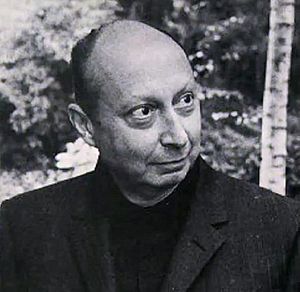Charles Bettelheim facts for kids
Quick facts for kids
Charles Bettelheim
|
|
|---|---|
 |
|
| Born | November 20, 1913 |
| Died | June 20, 2006 (aged 92) |
| Nationality | French |
| Scientific career | |
| Institutions | École Pratique des Hautes Études |
| Notable students | Arghiri Emmanuel |
Charles Bettelheim (born November 20, 1913 – died July 20, 2006) was a French economist and historian. He was a very important thinker about how countries could develop their industries. He started a special center for this, called CEMI.
Bettelheim also worked as an economic advisor for governments in many countries. These countries were often newly independent after being colonies. He was very influential in France and other parts of the world, like Spain, Italy, Latin America, and India. Many people saw him as a leading Marxist thinker.
Contents
Charles Bettelheim's Life Story
Charles Bettelheim was born in Paris, France. His father was from Vienna, Austria. In 1933, when Adolf Hitler came to power, Charles Bettelheim joined the "Young Communists." Later, he joined the French Communist Party.
He studied many subjects, including philosophy, sociology, law, and psychology. He also learned Russian. In 1936, he visited Moscow, the capital of the Soviet Union. He worked there as a tour guide and helped with French versions of a newspaper and films.
During his time in Moscow, he saw the start of the "Great Purges." This was a time when many people were arrested and punished in the Soviet Union. These experiences made him think critically about the Soviet system. Even so, he kept his communist beliefs. He was later removed from the Communist Party for his critical comments.
Becoming an Economist
After World War II, Charles Bettelheim became an official in the Ministry of Labor. He chose to study economics, which was not a very popular subject then. However, his knowledge of the Soviet Union and economic planning helped him a lot. In 1948, he joined a famous research school in Paris.
International Work and Cuba
In the 1950s, Bettelheim started working internationally. He advised leaders like Gamal Abdel Nasser in Egypt, Jawaharlal Nehru in India, and Ahmed Ben Bella in Algeria. In 1958, he created his research center, CEMI.
In 1963, Che Guevara invited him to Cuba. There, Bettelheim took part in a big discussion about how a socialist economy should work.
Focus on China
In 1966, Bettelheim became very interested in China. He visited the People's Republic of China many times. He wanted to learn about their new ways of developing industries, especially during the Cultural Revolution. He was impressed by how factories were run and how involved workers were.
Later Years
After 1980, Bettelheim's ideas became less popular. This was because many political changes happened in the world. The "hard-line socialism" he studied began to decline. This made debates about planned economies less relevant. Charles Bettelheim lived in Paris until he passed away in 2006. He did not publish much in his final years.
Charles Bettelheim's Ideas
Even after his difficult experiences in Moscow, Bettelheim still thought positively about Soviet socialism for a while. He admired their economic achievements. In 1956, he supported the changes made by Nikita Khrushchev to move away from Joseph Stalin's policies. He also liked the idea of giving more power to local decisions in economic planning.
Debates on Socialist Economies
In the 1963 Cuban debate, Bettelheim disagreed with Che Guevara. Guevara wanted to get rid of free markets quickly and have very fast, centralized industrial growth. He believed in motivating people morally.
Bettelheim thought differently. He suggested a more balanced economy for Cuba. He recommended focusing on agriculture, careful industrial growth, and broad central planning. He also thought some market elements could be useful. This was similar to a policy Vladimir Lenin had used in Russia. Bettelheim argued that economic rules, like the "law of value," were real and couldn't be changed just by wishing. They needed long-term social changes.
Challenging Old Marxist Ideas
This debate showed how Bettelheim's ideas differed from traditional Marxism. Old Marxism often believed that socialism would happen automatically with industrial growth. But Bettelheim thought socialism was about changing how society worked.
Inspired by China's Cultural Revolution and the ideas of Mao Zedong, Bettelheim argued against "economism." This was the idea that economic development alone would lead to social change. He believed that actively changing social connections and political actions were necessary.
He wrote a book called Economic Calculations and Forms of Ownership. In it, he said that just because the government owned factories didn't mean they were truly "socialist." He believed that real socialism meant people truly sharing in the production process. He also thought that socialist planning should measure the social usefulness of production, not just its market value.
Decline of Marxist Influence
In 1978, China changed its economic strategy. Under Deng Xiaoping, China focused more on economic growth and joining the world market. This was different from the "Maoist" approach Bettelheim had studied.
Because of these changes, the ideas about independent economic development that Bettelheim supported lost their influence. Also, Marxism itself became less popular, especially in France. This meant that thinkers like Bettelheim, who were Marxist critics, were less heard.
See also
 In Spanish: Charles Bettelheim para niños
In Spanish: Charles Bettelheim para niños
- Arghiri Emmanuel
 | Kyle Baker |
 | Joseph Yoakum |
 | Laura Wheeler Waring |
 | Henry Ossawa Tanner |

